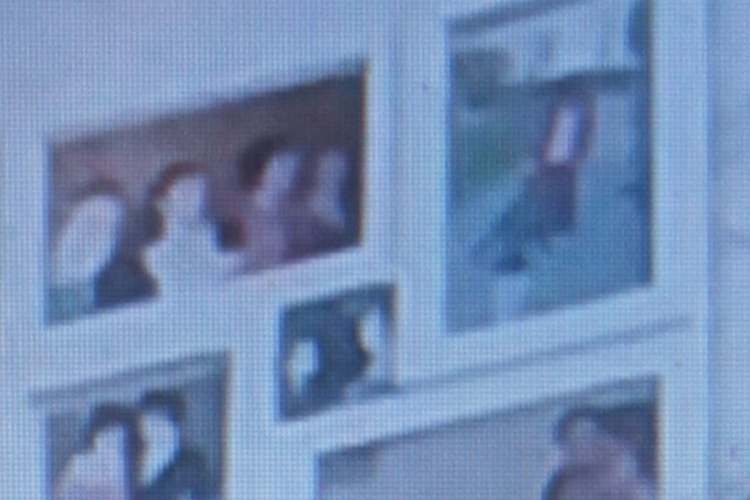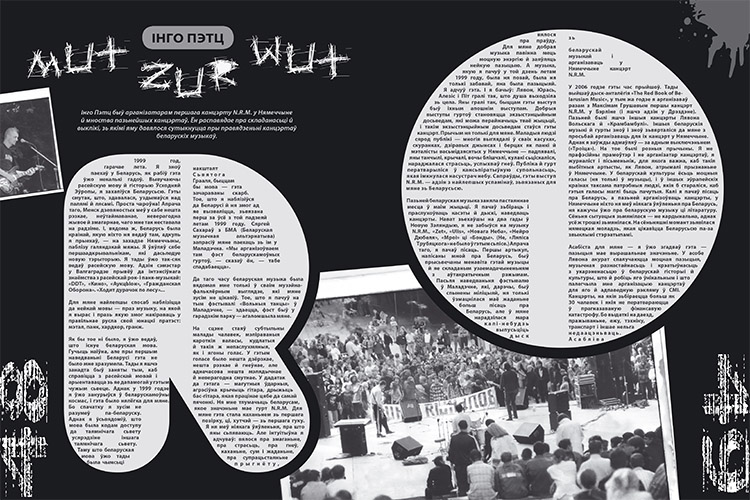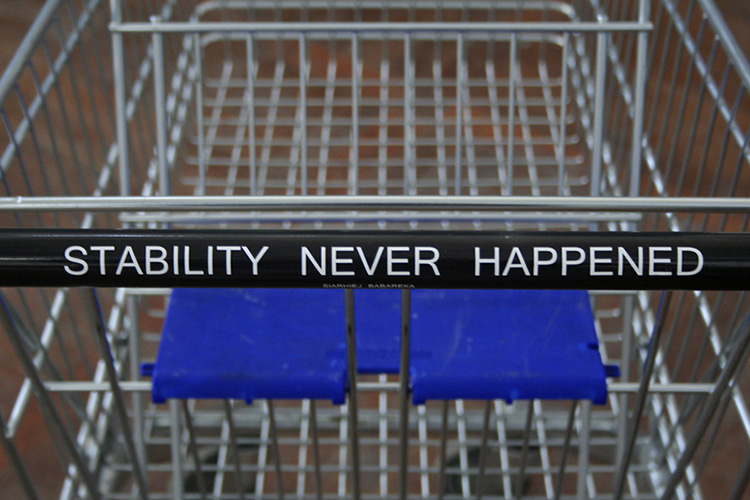
Аўтар: Tania Arcimović, 29/09/2014 | Cult Aktivist interview SPECIAL
MARINA NAPRUSHKINA: IT IS A PARALLEL WORLD
A year ago Marina Naprushkina, a Belarusian artist and author of the project Office for Anti-Propaganda who has been living and working in Berlin for a few years, launched a campaign Neue Nachbarschaft//Moabit. This is a volunteer initiative which works with refugees and protects their rights. Marina Naprushkina dwells on the campaign’s history, activities, outcomes and prospects.
Marina Naprushkina: It all started when I happened to be in court where a case of refugees was considered. I was wondering how the German judicial system was dealing with such issues, on the whole. According to the existing regulations, first refugees have to file an application for a political asylum in Germany. This procedure is very long, cases can be considered for years until they get a certain status. If the Federal Office of Migration and Refugees (BAMF) denies them, people have an opportunity to file a rebuttal to the court. Court hearings are mainly open and can be freely attended. I started going to the court on a regular basis, listening and making sketches, because it was the only way to speak about what was going on (photographing is forbidden in court rooms, as well as recoding the hearings).

Neue Nachbarschaft // Moabit, working with children
This is how The Refugees’ Library was born aimed at drawing public attention to the topic of migration policy in Germany and the European Union. This project has a collaborative nature. Many people are engaged in translations of notebooks into different languages. We hope that the “libraries” will be primarily demanded by the refugees themselves, and will help them prepare for their own processes.
I was immediately struck by what migrants — applicants for a residence permit — must face. Thus, sometimes it takes them around three or four years from the moment of their arrival in the country till their appearance in court, and, according to the law, within this period they can not officially get a job or enter a higher educational establishment.
And I have a question: what are they doing all this time? Although, of course, over these four years of waiting one could adapt and find a job.
Last year in Germany there was a huge wave of refugees: the numbers were almost as high as in the record 1994. Therefore, many new hostels for refugees appeared, one of them – not far from my place, in the next street. Chechen mothers with children who were living there started visiting the playground where I usually spent time with my child and we made friends. This is how I got to the hostel. Later I asked the local administration of the hostel to provide me with a room for an art studio. In the hostel there were about 100 children, they had no educator, they were on their own. I organized the studio, but soon I realized I was not able to manage this task on my own. Up to 40 children came to the studio each day, and then parents began to come eager to share their problems. I started proposing my friends to join me. This is how the initiative New Neighborhood // Moabit appeared. Now we have been working for a year and have more than 100 people involved, of whom about 50 are active.
More than 2 months we were working in the hostel building – we organized a five-days’ program for children: a kids disco, film shows, a sports studio. Then we launched language courses for adults and also started helping families to apply to the Ministry, to lawyers and doctors. Getting into a foreign country, having no language skills, people are faced with enormous challenges. Literally everything becomes a problem. Many of the refugees find themselves in a state of affect after all they have survived and it is very difficult to move around the city. It is hard to imagine what these people have to go through.
The problems of refugees is only becoming a public issue now. It is much written and talked about. A lot of controversy rises in terms of introducing changes into legislation. Right-wing conservative parties want to make laws for refugees harsher, to reduce payments and to complicate the asylum procedure. Public organizations and left parties, vice versa, fight for the abolition of the ban on the free movement and for the introduction of work permits for refugees.
Do you work as an official organization?
МN: No, we are not registered as any kind of association, because it is closely linked with bureaucracy. On the one hand, it would give us some advantages, we could, for example, officially raise donations. On the other hand, in doing so we would fit into the system, and this is not what we really want. Basically, I do not want to create an organization, it is rather a civic initiative.
There is a problem, and we are united around it and try to do something. When it disappears, the need for our actions would disappear, too.
Is this activity seen by you as an artist’s project or as a civil initiative? Do you personally draw any distinction line between these things?
МN: Consciously I do not separate my artistic career from this job. But at the moment I find it hard to fit it into any art system. This is not a project for the exhibition, but a long-term activity, although Württembergischer Kunstverein (Stuttgart) assisted me in launching the initiative. I had a budget for the project as a part of their program, and, roughly speaking, I proposed them to spend the money on apples and paint for kids. They agreed.
That is, now I do not think about any art prospects of this activity. There are many ideas related to art, as it can be used in working with people within the initiative. However, so far my work mostly deals with the process of the organization itself, which for me is also very creative.
On the project’s site there is no information about the people who are behind it. One can guess that you have to do with it only from the books on the trials where your style is easily recognized. Is such anonymity conscious?
MN: A year ago I really was an initiator, and I am also responsible for the main part of the work done. But from the beginning it was important to create a structure that would work by itself. In this work I was interested in two things: on the one hand, it was working with refugees, and on the other – I aimed at trying to organize such a functioning initiative, people could freely join at any level, to make the initiative that would work without any leaders. We deliberately avoid personalization. People work here exclusively on a volunteer basis. Someone can come more often, others – once a week. It totally depends on them. Every person contributes with their knowledge and time to the overall outcome. We have already achieved a lot.
I think that we are really changing the mood in the neighborhood, people began to notice the refugees, to join our initiative and to give a helping hand.
We do not havesponsors,we do notwant to beusedwithin various commercialcampaignsor politicalparty programs. One of the ways tomake a profitis a flea market thatweregularly set and through which we collectsomemoney for the refugees’ needs.We alsotry toenhance our contacts in the area, so we look fortrustees, for example, who could help to paychildren sport classes.
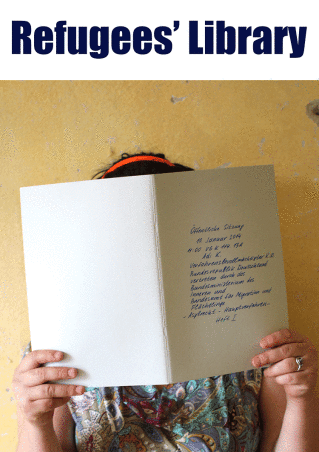
The poster for Refugees’ Library project
And how is the volunteer group organized?
МN: As I said, there is a large group of volunteers, a smaller part is made up of the main activists. There are subgroups that are engaged into small individual projects within the initiative and function on the basis of self-organization. Five times a week, we have classes for children and adults. Once a week, there are general group and sub-groups meetings to discuss various issues. For example, there is a group which deals with coordinating refugees in legal and bureaucratic issues. In this group there are a lot of law students, for them it is a good opportunity to acquire practical knowledge. They meet, distribute tasks, such as patronage of families who need to resolve their problems with a lawyer, to get a permission to enter a school, money problems or problems with a kindergarten.
As for the language courses, women take part in them very little, although many of them can not read and write. Often it is mothers with many children who in general have never studied at school, because they had no one they could leave their children with. For these women the situation is the most difficult, they have to work all the time. Sometimes you really get lost, since you have no idea of how to help them, how to give them support. Here the gender aspect is one of the central ones for me, I do not know how to put theory into practice.
And are the conditions of the trials the same for men and women?
MN: Technically, they are. But here, it is also more complicated for women, especially in getting asylum. Women are often more vulnerable in court. And it does not have to do only with emotions. In court men cry no less often than women. But for women it is harder to describe in court what had happened to them, especially in the cases of sexual violence or threat to children. Most men do not share with women their men’s affairs.
Women find it more difficult to argue their position and call the exact facts to convince the judges of the truth of their life stories. And that is what makes an impact on the result of the process.
Thus, now I am more interested in the trials where women take part.
What motivation do the activists come with? What brings them to start working?
МN: People come with different motivations, those are really numerous, and most of them do remain, and when they go, it happens because they move or start to study. We have many students who know only theory, they spend time sitting in front of the computer screens and do not know how to communicate with people, many of them have no idea about problems a traditional family might face. Here they do change, getting rid of their hidden prejudices.
When you work with people, you learn a lot – also about your own self, about your hidden stereotypes. I myself have changed a lot during this time.
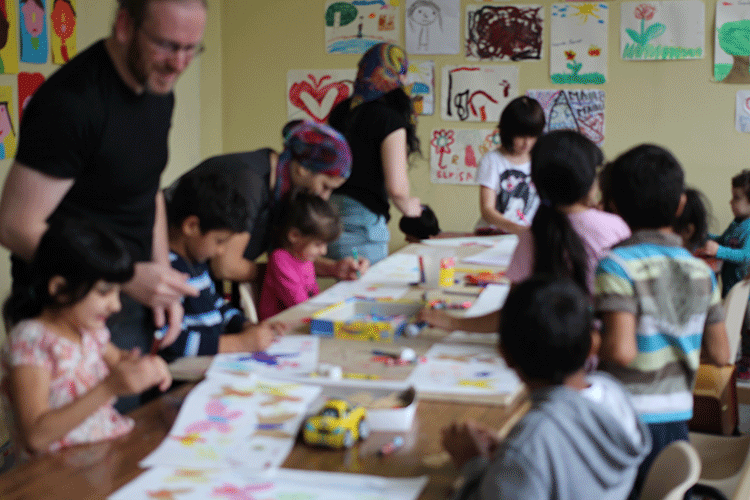
Working with children
For example, when you learn some refugees’ stories. In fact, we are not even aware of our prejudices… It is enough to see what we have been told about Chechnya, that there are only terrorists who live there. I caught myself thinking that, really, a Chechen is perceived in this very way. But this is not true.
Now the highest number of refugees who move to Germany come from the Russian Federation and the North Caucasus. I talked to people from Chechnya and Dagestan and made it clear for myself: we do not know what is happening there. There is not a single person there who is left sane. Kadyrov’s regime is a hidden war.
And why do they choose Germany as their desirable destination?
MN: Because in Poland they fear persecution from Kadyrov supporters. But Germany still makes them come back there. According to the Dublin agreement (a document regulating the relations between the EU countries in the asylum procedure. – Editor’s note), refugees from Germany are returned to the country through which they crossed the country’s border. And most often they flee through Belarus to Poland. It means that Poland is held responsible for the Russian refugees, this is where they need to apply for a refugee status. This is how Germany gets rid of 49% of the refugees.
But this does not solve the problem. Emigrants will keep coming here. Berlin is already a very international city.
And it is clear that those who now come here to stay, will continue changing the city’s face, and we will soon see these changes with our own eyes. This is our environment, and the more we learn about one another, the better it will be for all of us.
In the meantime, it is a parallel world. Tolerance is very conditional. Yes, we go to Turkish restaurants, buy products in the Arab stores, but we know nothing about them. Now, for example, a lot of Syrians arrive – but who are they? Certainly, in Germany, in comparison with other countries, the situation with helping refugees is much better. There are many organizations, for example, Flüchtlingsrat Berlin, which has already been dealing with the issue of refugees for 20 years. There are courses on legislation for activists: if you want, there is an opportunity to acquire knowledge. I am also a foreigner and get lost in all these laws.
So, your work happens to be differently oriented: there is an educational and a cultural direction, and separately there is work in court rooms, the battle for the living conditions for refugees, the spread of information.
MN: Yes, but we also do political work. For example, in the hostel, where we worked, we found a number of violations: showers did not function, there was no hot water, no kitchen, no educator to work with the children. We conducted an independent investigation and found out that the hostel administration belonged to a private company, which was getting enriched thanks to the refugees’ issue. That is, it was receiving from the state rather large sums of money for the maintenance of the hostels, but it did not follow the agreement. We held a demonstration, started talking about it, the problem was noticed, media began to write about it. And in response, the Ministry introduced a system of hostels inspection, which actually had not existed two years before.
When we gave a voice to the internal problems of the hostels, we wanted the refugees themselves to speak about them. But it was difficult to achieve, because not all the refugees are ready to defend their rights. They come from the countries where they have never been right, and here as well they will not believe in these rights. It is therefore important to work with these people, to accompany them to the Ministry, to force them to talk about their problems, because it is their right. Because, as I said, it is a parallel state. When you begin to walk with them through different organizations, you realize that they have no rights, they are discriminated against, including the discrimination from the part of their former compatriots. In their internal community there is its own hierarchy. It is hard to face it. For our activists, who do not speak other languages, it may be easier: they come, practice the German language and leave. And if you build relations sharing the same language and they tell you what is happening to them, it is hard.
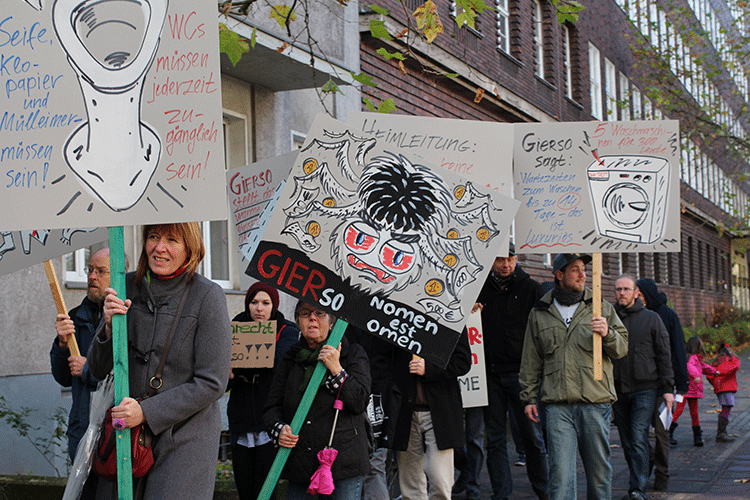
The demonstration, 2013
I heard that due to refugees and the unemployed the district Moabit is considered to be unsafe. How did its cultural and social landscape change in connection with your work?
MN: Moabit is a city center, but it used to be unpopular. In recent years, the prices for property rose, and the socially disadvantaged citizens were forced to leave the area and move to the outskirts of Berlin. And when the hostel appeared, this movement stopped. Frankly speaking, I was even happy about it, because I was worried that all the foreigners would be squeezed out of the district and it will be transformed into an elite area with the urban rich.
And why did the hostel open here?
МN:Not only here. There is a decree according to which everypart of the cityhas totake upa certain number of migrants. It is not possible, for example, to open ten hostels inMarzahn and none in the city center.Andthis is very logical. Because I think we need to recognize these people and to help them. There are separate hostels,which are subject to the Ministry of Internal Affairs, they are located in the suburbs,and it is really horrible there: 400people live in a hostel surrounded by wires.
I would like to ask my last question about the Biennial Manifesta 10, which this year took place in St. Petersburg, and with which a number of scandals was associated. I know that you were in a group of artists who boycotted the Biennale…
MN: Maksim Tymińko wrote a petition about the boycott and I decided to sign it. I was not in St. Petersburg. But the feeling at the time was such that in a situation that had developed around the Biennale, this format would not work. Moreover, it would create a certain image of that country.
Of course, art should not give up, it should speak about problems, take a certain position. In my opinion, in Belarus people often do not want to take such a position.
I am not only talking about Manifesta. I do not have any aspirations about a possibility of a vivid expression or productive work within the Biennale. It seems to me that we should seek for other forms. The exhibition format should be reorganized in order to make it work again. The 7th Berlin Biennale was just about it. And for me it was good evidence that proved that we may work differently with the exhibition.
Tania Arcimovič. August 2014. Translated by Volha Bubič
In September the initiative Neue Nachbarschaft // Moabit received an honorary prize of Berlin-Mitte (district in Berlin), which is annually presented to volunteer initiatives. Neue Nachbarschaft // Moabit shared this prize with others, but it is important to note that it is usually awarded to the initiatives that have been functioning for many years. Neue Nachbarschaft // Moabit became a single exception.
Photos © Neue Nachbarschaft // Moabit
Opinions of authors do not always reflect the views of pARTisan. If you note any errors, please contact us right away.



